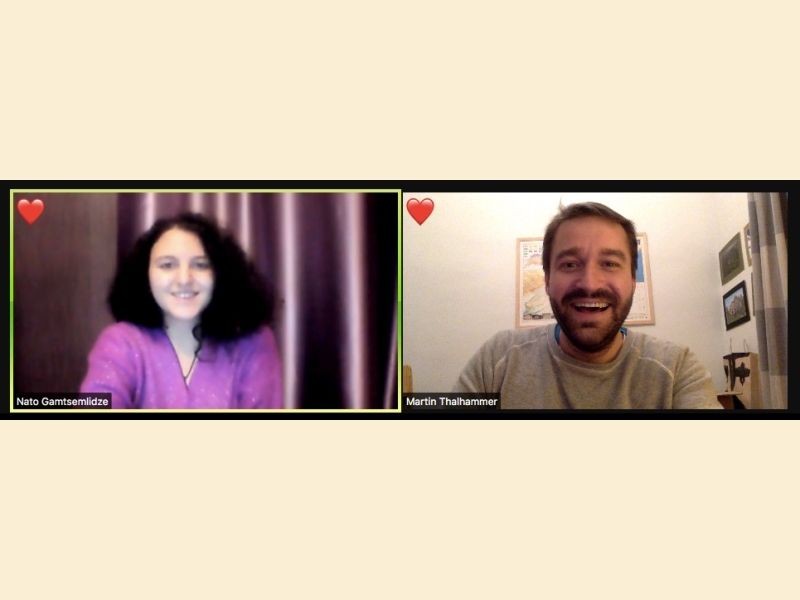“What unites us as a group is the aim to improve the teaching in formal education and to transform schools and universities into truly democratic institutions, where Citizenship is not only taught but actively lived!”
The series of materials about the Working Groups operating in EENCE in 2021 continues the acquaintance with the leaders of the group “Civic Education in Formal Education” Nato Gamtsemlidze and Martin Thalhammer (Georgia).
– Why did you come up with the idea to create such a group?
– Citizenship Education is often addressed through non-formal Education and within a life-time learning process. Nevertheless Citizenship Education plays a major part in formal education as well, even if there are some countries not such a subject foreseen in the national curricula for schools and universities.
Within the formal sector Citizenship Education both faces challenges and poses opportunities:
Outreach to all milieus of society
Since the school-enrollment in all of the EaP-countries and Russia is very high (all over 90%, Human Development Report, UNDP) citizenship education within the formal sector has the chance to reach out to all milieus of society, including most vulnerable groups. In this way citizenship education overcomes the limits of the so-called „NGO-Bubble“ and can reach out to beneficiaries, who would not be reached otherwise and integrate them in an learning and personal development process.
Institutionalized setting
The institutionalized setting of the formal educational sector has both advantages, but also disadvantages. On one hand side it guarantees stability and also long-term public funding, on the other hand Methodological approaches and also the variety of topics are restricted, due to limited time and national curricula.
Involvement of many stakeholders
Another big advantage of Citizenship Education in the formal sector is the involvement of many stakeholders, as for example school-/university-administration, fellow teachers and lectures, parents, or local self government and politicians. Of course the involvement of many stakeholders can also cause restrictions or limit the freedom of teaching.
The goal of this WG „Civic Education in Formal Education“ is to discuss the challenges and opportunities of CE in the formal educational sector of the EaP countries and Russia, to share material and teaching resources and to plan future corporations and partnerships.
– Tell us about the people in the group?
„Civic Education in Formal Education“ has overall 9 participants from all over Eastern Europe: from Albania to Russia! Most of our members work either way with schools and in the field of professional teachers training or at universities on educational and political topics.
What unites us as a group is the aim to improve the teaching in formal education and to transform schools and universities into truly democratic institutions, where Citizenship is not only taught but actively lived!
These democratic values are also reflected in their way of working and cooperation within our group: we follow an inclusive and interactive approach, where responsibilities are shared and discussions more than welcome.
New participants are always welcome to join our working-group! We are especially looking for additional members from Belarus, Moldavia and Armenia, in order to represent all EENCE-countries. So if you are interested, please do not hesitate to contact us!
– How do you see the results of the group’s work?
All our members have long standing working experience in the field, but the WG “Civic Education in Formal Education“ is relatively new. Therefore we can not yet say much about the results so far, but we as a group hope to establish a fruitful and inspiring space for experience sharing and professional exchange among our members. Depending on the topics and formats we would also like to open the WG, in order to broaden the audience and to let interested teachers and lectures participate.
– What would you personally, as a leader, like to do within the group?
As mentioned before, the WG follows a participatory approach with a rotating system for facilitation and shared responsibility. Since we are at the very beginning of this process, we hope that this approach works out for everybody within the group and that everybody finds their time and effort usefully and wisely spent.
What can be said after the first meetings is, that we would like to work on the topics of peace and conflict, tolerance and diversity, as well as Fake-News and critical thinking. We would also like to elaborate on how to bring interactive teaching methods like gamification, or debates into the class- and seminar-rooms of schools and universities.
Additionally it would be nice to compile some sort of compendium of different teaching material regarding one certain topic including different experiences and best practice examples of all the EaP-countries and Russia.
Some personal notes:
Our names are Nato Gamtsemlidze and Martin Thalhammer. We both work for the Civic Education Teachers Forum (CETF), which is a professional association working with over 1.700 Civic Education teachers and 1.500 schools all over Georgia. Our main goal is to contribute to the teachers` professional development, both through training and the development of interactive and learner-friendly material.

Nato Gamtsemlidze holds a MSC in Applied Psychology at the Georgian Institute of Public Affairs (GIPA) and has over six years of experience working in the educational field, focusing on Civic Education teachers’ professional development.
She is responsible project manager of CETF for the program „Momavlis Taoba – Future Generation“. Additional Nato started in 2020/2021 to teach Civic Education at school herself and is currently undergoing the preparatory teachers course.

Martin Thalhammer holds a MA in Peace Studies and International Politics of the University of Tuebingen, Germany.
Martin has over 10 years experience in implementing educational programs, both in Germany and abroad.
Currently he is supporting the Civic Education Teachers Forum (CETF) as a seconded professional of the German development agency Bread for the World.
See also:
“I firmly believe sharing knowledge and experience will make our community stronger”


